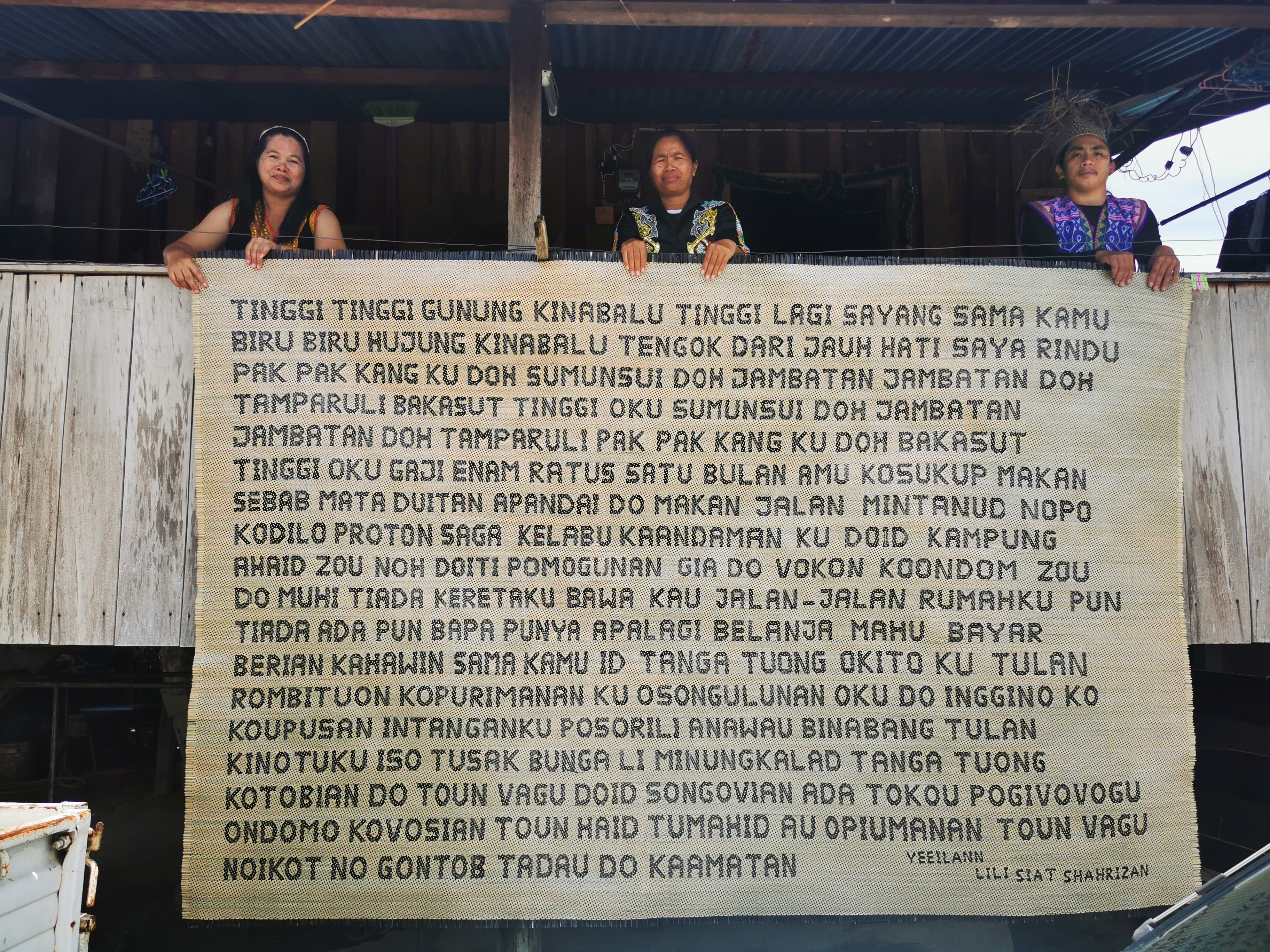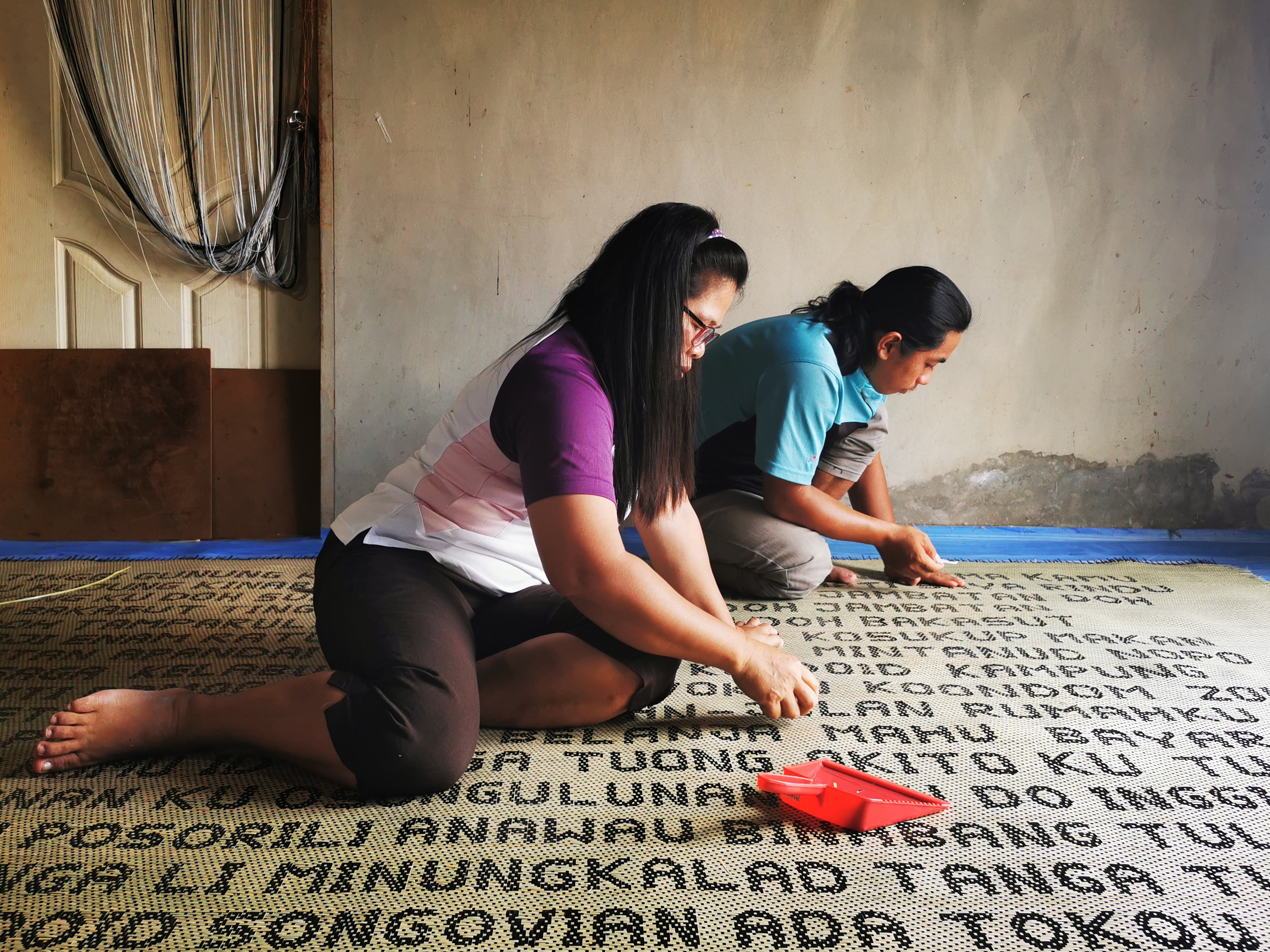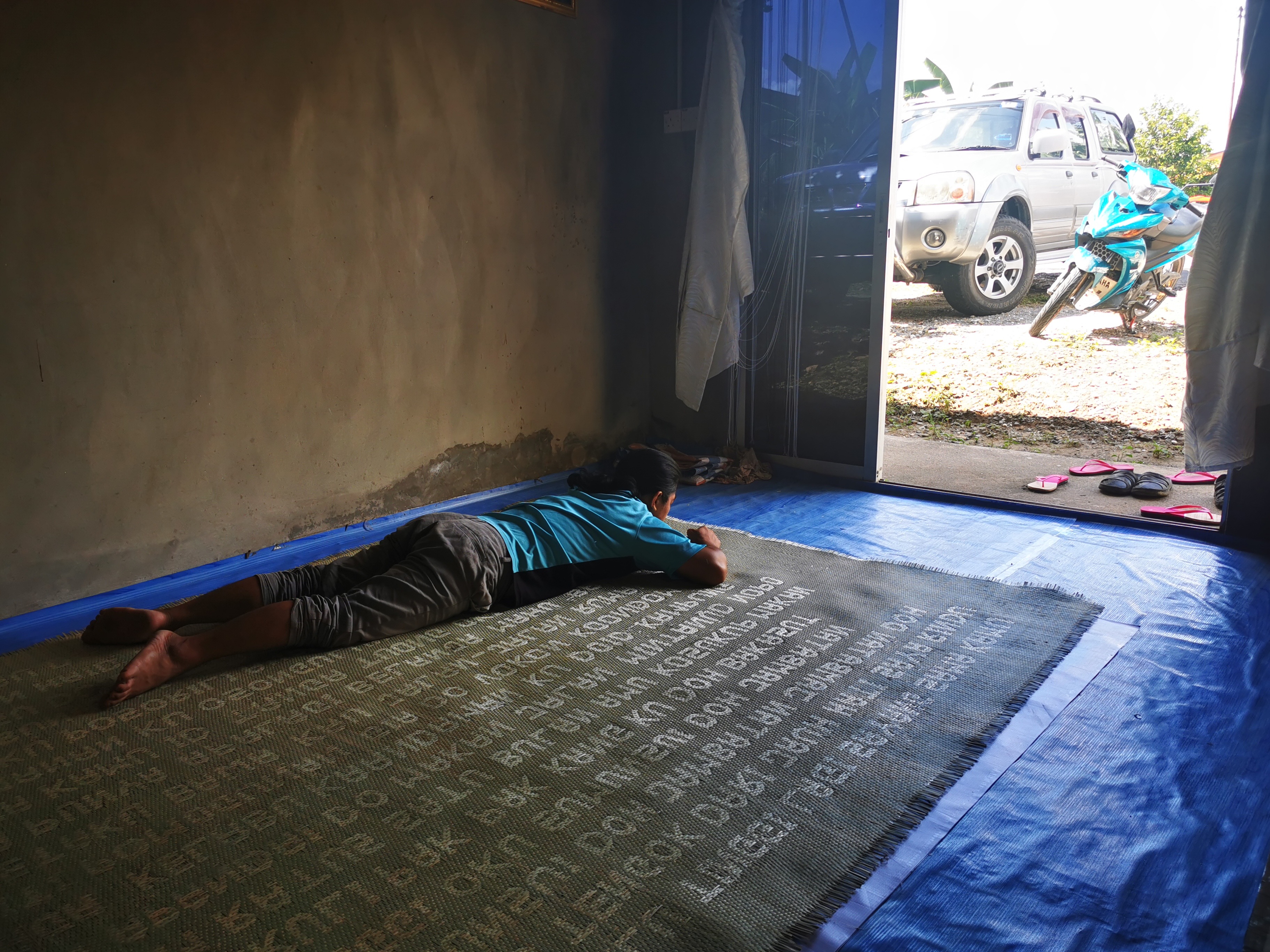Yee I-Lann
(with weaving by Lili Naming, Siat Yanau, and Shahrizan Bin Juin at Kampung Dangulad, Keningau, Sabah in tribute to popular songs by Sabahan lyricists)
Dusun Karaoke Mat:
Ahaid zou noh doiti
2020
Split bamboo pus, black natural
‘Kayu uber’ dye, matt sealant
221cm x 317.5cm

Dusun Karaoke Mat: Ahaid zou noh doiti is a collaboration between Yee and indigenous weavers in Sabah, a northern Borneo state in Malaysia. It is made by the Dusun and Murut communities from Keningau, an interior district known for rebellion against colonial rule and resistance to join the Federation of Malaysia in 1963 in light of their ambition for self-rule and independence. The woven mat called tikar in Malay, tikam (Kadazan), galum (Dusun Liwan), apin (Murut) is a functional egalitarian object that enables people to commune. When laid out, the tikar becomes a place for social gatherings; when hung, it becomes a object that functions like a billboard, recounting the histories and narratives of a community. Dusun Karaoke Mat gathers lyrics from Kadazan Dusun popular songs which are woven together using bamboo pus into a mat. Yee has lamented that although she has lost the Kadazan language of her grandmother’s tongue through the political manipulations of the Federal nation-state, these songs act as populist resistance anthems and as linguistic portals or mnemonic triggers to an aural tone she considers part of her genetic memory.
The map and the mat are both sites of relation and demarcation. The map in Borneo Heart allows us to recognize the centrality of Borneo in how the Malay archipelagic world has been structured, and most relevantly in this exhibition, how issues surrounding Sabah were pertinent in the playing out of imaginations of pan-Malayan ethnos and confederation formations in relation to the complex entanglements of nationalism, sovereignty, and neo-colonial tutelage in the 1960s. The mat in Dusun Karaoke Mat materializes a communal mode of meaningmaking by way of the locally cultivated craft, the artisans that continue this tradition, on the one hand; and, the vitality and the poetic constitution of senses of community by way of popular media, on the other. Yee’s works actualize the compelling intricacies of regional imagination and formation as the works address these imaginations’ limits, and direct us to the thriving agencies of the people that constitute and continually weave the region’s destiny and contemporary history.
Yee I-Lann (b. 1971) currently lives and works in Kota Kinabalu in the Malaysian Borneo state of Sabah. Her primarily photomedia-based practice engages with archipelagic Southeast Asia’s turbulent history with works addressing issues of colonialism and neo-colonialism, power, and the impact of historic memory in social experience, often with particular focus on counter-narrative “histories from below.” She employs a complex, multi-layered, visual vocabulary drawn from historical references, popular culture, archives, and everyday objects. She has in recent years started working collaboratively with sea-based and land based communities and indigenous mediums in Sabah. She is a co-founding associate of The Ricecooker Archives: Southeast Asian Rock ‘n’ Roll Treasury with her partner Joe Kidd and has worked as a production designer in the Malaysian film industry. She is currently a board member for Forever Sabah and Tamparuli Living Arts Center (TaLAC), both based in Sabah.
Popular Sabah Kadazan Dusun songs, literal English translation:
So high is Mount Kinabalu my love for you is higher so blue is the edge of Kinabalu seen from far my heart is longing i make a pak pak sound as i walk along the bridge the Tamparuli bridge in my high-heeled shoes as i walk along the bridge the Tamparuli bridge i make a pak pak sound in my high heeled shoes Salary of 600 a month is not enough to eat with eyes just for money clever to look for ways busy following the gray Proton Saga Memories of the kampung I’ve been here a long time this place belongs to others I want to go home Don't have a car to take you driving don't have a house that's not my father’s what’s more paying a dowry to marry you In the middle of the night I see lit by the moon and stars aware of being alone left by the beloved I look around me illuminated by moonlight I pick a flower blossoming in the middle of the night Happy new year to everyone let’s not be jealous think of the good the year went by without us realising it the time has come for us to be thankful for the harvest
Song lyricist, song lyrics in the original Kadazan or Dusun language + translations into Malay and English:
1) “Sayang Kinabalu” by Kimin Mudin
Sabah Malay: Tinggi tinggi gunung Kinabalu / tinggi lagi sayang sama kamu / biru biru hujung Kinabalu tengok dari jauh / hati saya rindu
English: So high is Mount Kinabalu / my love for you (Kinabalu) is higher / so blue is the edge of Kinabalu seen from far / my heart is longing
2) “Jambatan Tamparuli” by Justin Lusah
Dusun: Pak pak kang ku doh sumunsui doh jambatan jambatan doh Tamparuli bakasut tinggi oku / sumunsui doh jambatan jambatan doh Tamparuli pak pak kang ku doh bakasut tinggi oku
English: i make a "pak pak" sound as i walk along the bridge the Tamparuli bridge in my high-heeled shoes / as i walk along the bridge the Tamparuli bridge i make a "pak pak" sound in my high heeled shoes
3) “Proton Saga kalabu” by jokteo akang
Dusun: Gaji enam ratus satu bulan / amu kosukup makan / sebab mata duitan / apandai do makan jalan / mintanud nopo kodilo proton saga kelabu
Sabah Malay: Gaji enam ratus satu bulan / tak cukup untuk makan / sebab mata duitan / (wanita) pandai cari jalan / asyik mengikut kereta proton saga kelabu (diaorang la ba ni selalu ikut2 lelaki yg berlainan)
English: Salary of 600 a month / is not enough to eat / with eyes just for money / (woman) clever to look for ways / busy following the gray Proton Saga (following many different guys - following wealth or status)
4) “Kaandaman doid kampung” by Irene Thaddeus (singer) music & lyrics by Gundohing Thaddeus Majakul
Kadazan: Kaandaman ku doid kampung / ahaid zou noh doiti / pomogunan gia do vokon / koondom zou do muhi
Malay: Teringat saya di kampung / lama suda saya disini / tempat orang lain / saya teringin mahu pulang
English: Memories of the kampung / I’ve been here a long time / this place belongs to others / I want to go home
5) “Tanak Kampung” by Jimmy Palikat
Sabah Malay: Tiada keretaku bawa kau jalan-jalan / rumahku pun tiada ada pun bapa punya / apalagi belanja mahu bayar berian / kahwin sama kamu
English: Don't have a car to take you driving / don't have a house that's not my father’s / what’s more paying a dowry / to marry you
6) “Kosorou kopo nangku doho” by Jestie Alexius
Dusun: Id tanga tuong / okito ku tulan rombituon / kopurimanan ku osongulunan oku / do inggino ko koupusan // Intanganku posorili / anawau binabang tulan / kinotu ku iso tusak bunga / li minungkalad tanga tuong
Malay: Di tengah malam / ku lihat sinaran bulan bintang / tersedarlah ku kini kesorangan / ditinggal pergi yang tersayang // Ku pandang di sekitarku / diterangi cahaya sinaran bulan / ku petik pucuk setangkai bunga / mekar berkembang di tengah malam
English: In the middle of the night / I see lit by the moon and stars / aware of being alone / left by the beloved // I look around me / illuminated by moonlight / I pick a flower / blossoming in the middle of the night
7) “Kasakazan Bambaazon” by Datuk Claudius Sundang Alex
Kadazan: Kotobian do toun vagu doid songovian, ada tokou pogivovogu, ondomo kovosian // Toun haid tumahib au opiumanan, toun vagu noikot no gontob, tadau do kaamatan
Malay: Selamat tahun baru kepada semua, jangan kita ada irihati, tapi fikirkan yang terbaik // Tahun lepas sudah limpas tanpa disedari, tahun baru sudah sampai dengan penuh berkat tuaian.
English: Happy new year to everyone, let’s not be jealous, think of the good // The year went by without us realising it, the time has come for us to be thankful for the harvest
So high is Mount Kinabalu my love for you is higher so blue is the edge of Kinabalu seen from far my heart is longing i make a pak pak sound as i walk along the bridge the Tamparuli bridge in my high-heeled shoes as i walk along the bridge the Tamparuli bridge i make a pak pak sound in my high heeled shoes Salary of 600 a month is not enough to eat with eyes just for money clever to look for ways busy following the gray Proton Saga Memories of the kampung I’ve been here a long time this place belongs to others I want to go home Don't have a car to take you driving don't have a house that's not my father’s what’s more paying a dowry to marry you In the middle of the night I see lit by the moon and stars aware of being alone left by the beloved I look around me illuminated by moonlight I pick a flower blossoming in the middle of the night Happy new year to everyone let’s not be jealous think of the good the year went by without us realising it the time has come for us to be thankful for the harvest
Song lyricist, song lyrics in the original Kadazan or Dusun language + translations into Malay and English:
1) “Sayang Kinabalu” by Kimin Mudin
Sabah Malay: Tinggi tinggi gunung Kinabalu / tinggi lagi sayang sama kamu / biru biru hujung Kinabalu tengok dari jauh / hati saya rindu
English: So high is Mount Kinabalu / my love for you (Kinabalu) is higher / so blue is the edge of Kinabalu seen from far / my heart is longing
2) “Jambatan Tamparuli” by Justin Lusah
Dusun: Pak pak kang ku doh sumunsui doh jambatan jambatan doh Tamparuli bakasut tinggi oku / sumunsui doh jambatan jambatan doh Tamparuli pak pak kang ku doh bakasut tinggi oku
English: i make a "pak pak" sound as i walk along the bridge the Tamparuli bridge in my high-heeled shoes / as i walk along the bridge the Tamparuli bridge i make a "pak pak" sound in my high heeled shoes
3) “Proton Saga kalabu” by jokteo akang
Dusun: Gaji enam ratus satu bulan / amu kosukup makan / sebab mata duitan / apandai do makan jalan / mintanud nopo kodilo proton saga kelabu
Sabah Malay: Gaji enam ratus satu bulan / tak cukup untuk makan / sebab mata duitan / (wanita) pandai cari jalan / asyik mengikut kereta proton saga kelabu (diaorang la ba ni selalu ikut2 lelaki yg berlainan)
English: Salary of 600 a month / is not enough to eat / with eyes just for money / (woman) clever to look for ways / busy following the gray Proton Saga (following many different guys - following wealth or status)
4) “Kaandaman doid kampung” by Irene Thaddeus (singer) music & lyrics by Gundohing Thaddeus Majakul
Kadazan: Kaandaman ku doid kampung / ahaid zou noh doiti / pomogunan gia do vokon / koondom zou do muhi
Malay: Teringat saya di kampung / lama suda saya disini / tempat orang lain / saya teringin mahu pulang
English: Memories of the kampung / I’ve been here a long time / this place belongs to others / I want to go home
5) “Tanak Kampung” by Jimmy Palikat
Sabah Malay: Tiada keretaku bawa kau jalan-jalan / rumahku pun tiada ada pun bapa punya / apalagi belanja mahu bayar berian / kahwin sama kamu
English: Don't have a car to take you driving / don't have a house that's not my father’s / what’s more paying a dowry / to marry you
6) “Kosorou kopo nangku doho” by Jestie Alexius
Dusun: Id tanga tuong / okito ku tulan rombituon / kopurimanan ku osongulunan oku / do inggino ko koupusan // Intanganku posorili / anawau binabang tulan / kinotu ku iso tusak bunga / li minungkalad tanga tuong
Malay: Di tengah malam / ku lihat sinaran bulan bintang / tersedarlah ku kini kesorangan / ditinggal pergi yang tersayang // Ku pandang di sekitarku / diterangi cahaya sinaran bulan / ku petik pucuk setangkai bunga / mekar berkembang di tengah malam
English: In the middle of the night / I see lit by the moon and stars / aware of being alone / left by the beloved // I look around me / illuminated by moonlight / I pick a flower / blossoming in the middle of the night
7) “Kasakazan Bambaazon” by Datuk Claudius Sundang Alex
Kadazan: Kotobian do toun vagu doid songovian, ada tokou pogivovogu, ondomo kovosian // Toun haid tumahib au opiumanan, toun vagu noikot no gontob, tadau do kaamatan
Malay: Selamat tahun baru kepada semua, jangan kita ada irihati, tapi fikirkan yang terbaik // Tahun lepas sudah limpas tanpa disedari, tahun baru sudah sampai dengan penuh berkat tuaian.
English: Happy new year to everyone, let’s not be jealous, think of the good // The year went by without us realising it, the time has come for us to be thankful for the harvest


Yee I-Lann with weaving by Lili Naming, Siat Yanau, and Shahrizan Bin Juin at Kampung Dangulad, Keningau, Sabah in tribute to popular songs by Sabahan lyricists

